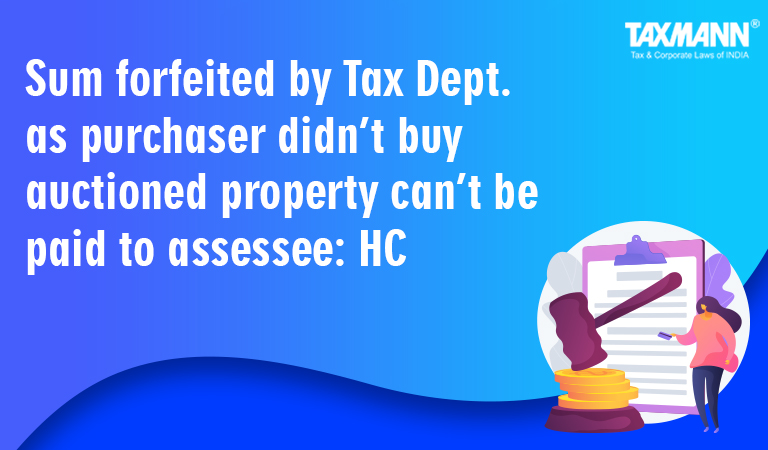Sum forfeited by Tax Dept. as purchaser didn’t buy auctioned property can’t be paid to assessee: HC
- Blog|News|Income Tax|
- 2 Min Read
- By Taxmann
- |
- Last Updated on 15 September, 2021

Case details: Ashwani Kumar v. ITO - [2021] 130 taxmann.com 57 (Punjab & Haryana)
Judiciary and Counsel Details
-
- Ajay Tewari and Vikas Bahi, JJ.
- Manpreet Singh Kanda, Adv. for the Petitioner.
- Kunal Sharma, Adv. for the Respondent.
Facts of the Case
Assessing Officer (AO) made an addition of a certain amount on account of cash deposits received by assessee treating same as unexplained income of the assessee. Two shops of the assessee were attached for recovery of tax payable by the assessee.
The said shops were auctioned to Mr. Ashok Kumar who paid only 25 percent of the total auction amount and did not pay the balance amount. Accordingly, the auction failed and said the amount of 25 percent was forfeited to the account of the Government.
Assessee filed writ petition before the High Court contending that forfeited amount was required to be credited to the account of the assessee as the same was received in the process of auction of the shops owned by him.
High Court Held
The Punjab & Haryana High Court upheld the action of the Income-tax Officer (ITO). The forfeited amount was credited to the Government account in accordance with the procedure and mandate contained in Rule 58 of the said Schedule II of the Income-tax Act, 1961.
Reference has also been made to rule 57 of Schedule II of the Income-tax Act, 1961. The forfeiture of the deposit was a matter between the defaulting purchaser and the ITO and the assessee has no privity of contract or right or interest in the said amount. No loss had been caused to the assessee since the auction would be conducted afresh.
Further, the assessee hadn’t challenged the above-mentioned rules. The Rules being very clear, thus, the forfeited amount had to be forfeited to the Government and not credited to the assessee. Even otherwise once the auction was not successful then as per the above-said Rules, the property is required to be re-auctioned. In case, the re-auction is successful then the assessee will have the benefit of the sale proceeds.
Thus, considering from any aspect, the impugned action of the ITO is in accordance with law and deserves to be upheld
Disclaimer: The content/information published on the website is only for general information of the user and shall not be construed as legal advice. While the Taxmann has exercised reasonable efforts to ensure the veracity of information/content published, Taxmann shall be under no liability in any manner whatsoever for incorrect information, if any.

Taxmann Publications has a dedicated in-house Research & Editorial Team. This team consists of a team of Chartered Accountants, Company Secretaries, and Lawyers. This team works under the guidance and supervision of editor-in-chief Mr Rakesh Bhargava.
The Research and Editorial Team is responsible for developing reliable and accurate content for the readers. The team follows the six-sigma approach to achieve the benchmark of zero error in its publications and research platforms. The team ensures that the following publication guidelines are thoroughly followed while developing the content:
- The statutory material is obtained only from the authorized and reliable sources
- All the latest developments in the judicial and legislative fields are covered
- Prepare the analytical write-ups on current, controversial, and important issues to help the readers to understand the concept and its implications
- Every content published by Taxmann is complete, accurate and lucid
- All evidence-based statements are supported with proper reference to Section, Circular No., Notification No. or citations
- The golden rules of grammar, style and consistency are thoroughly followed
- Font and size that’s easy to read and remain consistent across all imprint and digital publications are applied



 CA | CS | CMA
CA | CS | CMA
